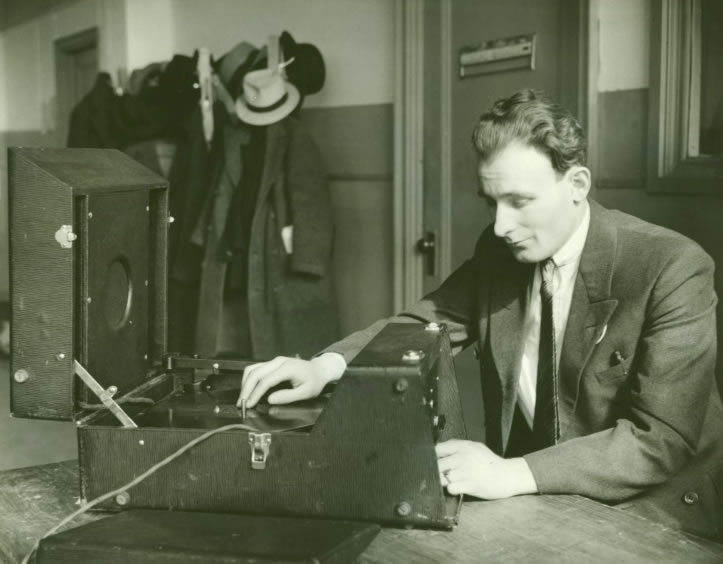Blind worker at the American Foundation for the Blind tests a Talking Book machine before it is sent out, circa 1937. Talking Book Archives, American Foundation for the Blind.
The manufacture of machines began in December 1935 at the WPA's workshop at 475 Tenth Avenue in Manhattan. AFB manufactured and distributed Talking Book machines under a WPA contract on behalf of the Library of Congress until June 1942. At a time of soaring unemployment, AFB's Talking Book program succeeded in securing jobs for people with vision loss. This was in large measure due to the determination of AFB's Executive Director, Robert B. Irwin, who constantly cajoled and solicited the WPA to retain workers who were disabled. In January 1937, Robert B. Irwin wrote the following in a report about the Talking Book program:
If Portia could step from Shakespeare's pages into the Works Progress Administration's workshop at 475 Tenth Avenue, New York City, which makes the electric reading machines for the Talking Books for the blind, she would discover that more than the quality of mercy was twice-blessed. She would find there forty sightless citizens, taken off relief, busily and happily employed along with 160 sighted workers, in the manufacture of these special phonographs, devised to bring a new interest and a new zest to the lives of their fellow blind throughout the country. The employment gives these blind workers both self-respect and a sense of independence; the machines they make open up to the nation's needy blind the inspiration and the entertainment of over a hundred worthwhile books ...
Irwin continues to explain how workers who are blind came to be employed in assembling machines:
... One part of the assembly work called for adjustment of a diminutive screw. This could be done only by hand. One man after another felt sure that he could do it, and yet one man after another found his fingers all thumbs when he tired to manipulate the tiny part. It then occurred to Mr. Kleber ... that many who are without sight come to develop an unusual sense of touch. He called in a blind man from the relief rolls, and - "Presto!" - the sensitive fingers went at once to work ...
This page includes an audio clip from the first Talking Book Topic audio recording in March 1939.
Select to listen to audio:
MP3 Audio of Talking Book Topic
Transcript of Talking Book Topic
[A whistle blows twice. A male voice in the background calls, "Mailman!"]
Joe: Morning, Mr. Walters. How are you this morning?
Mr. Walters: I'm very well, thank you Joe.
Joe: Haven't got very much for you this morning, Mr. Walters. Just a little pamphlet, no letters.
Mr. Walters: Oh, I suppose it's an advertisement.
Joe: Eh, let's see. It's got the name printed on it. "Talking Book Topics."
Mr. Walters: Oh, Topics. Oh, that's fine, I've been looking forward to that.
Joe: You're the first person I've met that looked forward to advertisements, Mr. Walters.
Mr. Walters: Oh, but this isn't an advertisement. This is a little booklet that tells me about new Talking Books. I'm about out of reading matter, so it'll come in handy.
Joe: You've told me about that machine of yours. Must be great company for you.
Mr. Walters: It certainly is. I live here alone, you know, it helps me to keep up with things. I used to be a great reader.
Joe: Well now, what do you do about this little pamphlet? You just can't put it in your machine and have it read to you, can you?
Mr. Walters: [Laughs] No, I wish I could. No, the Talking Book machine only reads records, Joe. But the fact is there's a lady, a very kind lady, who comes to see me once or twice a week. She reads the newspaper and other things that I can't get on record.
Joe: Oh, I see. You don't depend altogether on your machine.
Mr. Walters: She's a very kind lady, but sometimes she reads more like a machine than my Talking Book does." [They laugh]
Joe: Well, alright, I haven't more time, Mr. Walters, or I'd read it to you myself.
Mr. Walters: Well, I'd better be getting along. Ooh, this bag is heavy. Well, I'll probably be back this afternoon.
Mr. Walters: Good-bye, Joe.
